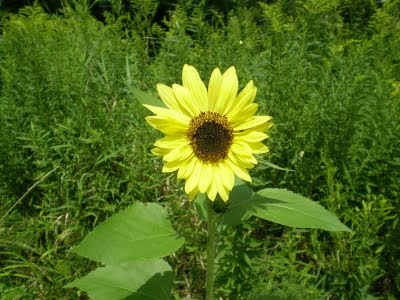

src="http://pagead2.googlesyndication.com/pagead/show_ads.js">
The Lemon Queen -"The best bar in town."
The first of the Lemon Queen Sunflowers opened August 21st despite the cold and wet summer. Another followed the next day, a another dozen or so should be open this week. Actually, they grew pretty well; seeds planted along a back garden fence June 5 , sprouted four days later. Good for a cold wet summer.
The sunflower seeds were free from the Great Sunflower Project started by a San Francisco University biology professor, Gretchen LeBuhn. The project asks participants to become a “citizen scientist”. For about five minutes a week or so, citizen scientists are asked to count the number of bees and, if possible what species, which visit the sunflowers. Then record the data and submit it. There are over 65,000 citizen scientists in North America watching and counting.
Health and Food - We need the bees.
Bees and other pollinators are critical. In the US alone, bee activity contributes $15 billion in agricultural production.
And maybe the bees should be discussed in town hall meetings focused on health care.
“Of the top 150 prescription drugs used in the US, 118 originate from natural sources. 74 percent from plants, 18 percent from fungi, 5 percent from bacteria, and 3 percent from a species of snake! And, where did the ingredients from your lunch or dinner come from? One of every three bites you took probably came from a plant pollinated by wild pollinators. This is just the beginning of the list of the services provided by healthy, natural ecosystems," according to the Great Sunflower Project.
Here is the link for the Great Sunflower Project and this is a link to further information in an front page article from the San Francisco Chronicle.
The Lemon Queen Sunflower was chosen for the Great Sunflower Project because, "They are the best bar in town," according to LeBuhn. If no bees are noticed on the sunflowers, it indicates a problem with the population in that neighborhood.
Trouble in Bee World
Wild pollinators and the non-native honey bees are in trouble for a number of reasons and their populations have been dwindling at an alarming rate. But there are very few and limited studies about these valuable creatures. "we have to pay attention," LeBuhn told the Chronicle.
Some research, from Penn State and other universities, indicate the problems facing the pollinators are a combination of factors, including: lack of good native plants, loss of habitat, widespread use of killer pesticides, mites and other disease organisms.
Pollinator gardens are another very important way to help. A pollinator garden, useful in the vegetable garden or anywhere, is comprised of native plants and flowers which benefit the pollinators and bloom continuously throughout the season. This is a good time of the year to start a pollinator garden in most of garden Zone 5 in the US.
Independent Book Stores : Click the ad to link up Independent book stores in your area. How about a book on pollinators?

Grange News
Nominations for the Ag Hall of Fame and the Ag Industrial for Crawford County are due by September 10. The names should be submitted to either Chester Tau or Susan Tau. Both awards recognize outstanding achievements in agriculture. The award program is organized by the Grange but involves all agricultural organizations in the county. Awards will be presented at the annual banquet in November. For more information, contact the Ag Extension Office in Meadville at 814-333-7460.
For the Heck of It:
August 26th is National Dog Day, at least get some treats for the dog.
And this is cool, while trying to figure out my latitude and longitude for the Sunflower Project I came across this Web site. Enter your address and you get it.
Get ready the next Full Moon is September 4, the Full Corn Moon.
From the Sunflower Project:...the value of pollination services from wild pollinators in the U.S. alone is estimated at four to six billion dollars per year. While these ecosystem services are currently produced for “free”, replacing the natural ecosystem would cost many trillions of dollars. Unless human activities are carefully planned and managed, valuable ecosystems will continue to be impaired or destroyed.
Good Blogs to Read:
Vincent di Fondi- Vincent just published his first novel, Blessed Abduction, available through the link above. Or check his blog to learn more about the novel and his new home in Costa Rica.
On Your Way to the Top – Kathleen always has good insights
New York's Southern Tier – A travel destination in nearby New York by Richardson
Urban Veggie Blog – Dan is located in nearby Ontario and is a good gardener.
Other articles I have written for Helium can be found by clicking the title; others can be found below in the box at HubPages.
There is A bee that continues to enjoy my nasturtiums!
ReplyDelete